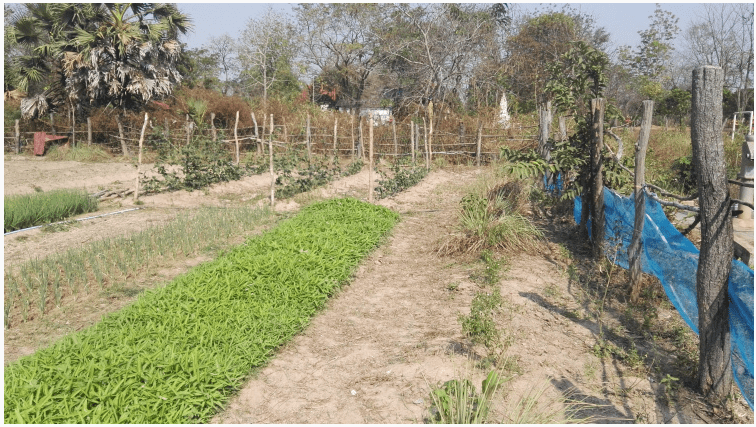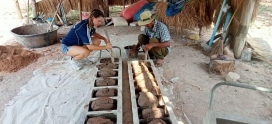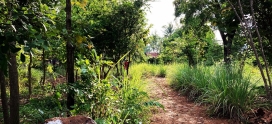Vegetable Gardens in Cambodia Change Lives
Patricia Cliff from Trish Travel Food, recently visited Green Shoots Agriculture Project in Cambodia and here is her blog about it. Originally posted on: TrishTravelFood
Siem Reap in Cambodia is the tourist gateway to the temples at Angkor Wat. When I flew there from Vietnam in March I headed two hours further north to Samrong and visited something completely different – school vegetable gardens! I travelled with a friend to visit three schools that are involved in the Green Shoots Foundation program for developing Agricultural Skills in Public Schools (ASPUS).
Green Shoots Foundation is a small charity based in London and this visit was arranged by Muneezay Jaffrey the Operations Manager there. On arrival in Samrong we were met by Ratana Oeurn and the team at the Community-based Integrated Development Organisation (CIDO). CIDO is the local partner of the foundation and delivers the programs incorporating sustainable and environmentally friendly agricultural skills within the school curriculum.
I am grateful to both Muneezay and Ratana for the time and care they took in arranging this visit and the willingness they had to answer my questions about the program. I would also like to thank the schools, teachers, and students who took the time to meet with us, talk with us and to show us and share with us the vocational vegetable gardens they have developed.
To date, in Odar Meanchey province, there are 43 schools with vegetable gardens, 48 teachers trained in sustainable gardening and 8,900 students trained in sustainable gardening.
The School Vegetable Gardens
The three schools we visited were a mix of primary and secondary level and in all three schools, you could see the vegetable garden as you came into the school. I loved the ‘impression’ that having such an instantly visible garden gave to the school grounds. It was immediately clear that each garden was a dedicated and well-tended space and was integral to the school.
The children we met were enthusiastic about being a part of the vegetable garden project and we felt welcome as guests. The school children had helped to build each of the gardens and they had been designed such that there was plenty of space to walk around and between the rows of crops, and to be able to easily tend to and harvest the crops from either side of a row.
As part of the Green Shoots Foundation’s Food Agriculture & Social Entrepreneurship program ASPUS, as its initial focus specifically addresses a lack of education and skills in rural areas and promotes sustainable farming techniques. I was, therefore, interested to see and learn more about which environmental, sustainable and regenerative agricultural practices were being used in the vegetable gardens and how these worked or were adapted to the Cambodian climate. The staff I chatted to at the schools were happy to point out these practices and to share more information about them.
Below are photographs of some of the practices being used in the vegetable gardens.
Dry and wet composting (to reduce reliance on chemical fertilisers)
I was curious to learn which crops would be best suited to grow in the Cambodian climate (year round warm/hot with a wet and dry season). Crop choice was informed partly by the need to grow different crops in rotation to help maintain soil health and to include slower and faster-growing crops so that crops were at different stages of the growing cycle. This allowed children the opportunity to learn about the different stages of the growing cycle.Crops growing at the time of the visit included:
Aubergine
Morning Glory
Beans
Winter Melon
Chatting with the teaching staff at the schools they were observing what was happening in the garden year on year, building up knowledge so that they knew the yields and/or market value of the produce they were growing, how long it took for the crops to grow from seed to harvest and what grew well. As part of the ASPUS program, each school has a dedicated teacher for the scheme who has been through a training program to equip them to integrate the vegetable garden into the teaching curriculum.
Protection for Seedlings and weed suppression
In future, the idea is to replace the black plastic possibly with a mulch. There were also discussions about pests and pest control and about how much interpretation might be needed/was appropriate in the garden.
Edible borders and flowers to attract pollinators
The edges of the gardens were planted up with lemon grass and mint as a first step to creating edible borders. Nearby to the gardens were beautiful flowers to attract pollinators.
Reflections
The visit to the schools in Cambodia has had a profound effect on me. The visit was inspiring and reminded me of how something as simple as a community edible space designed on sustainable and regenerative practices can have multiple positive effects on both people and places. Ratana shared the mission of CIDO, that, “Cambodian people have social and economic security that would enable them to have a productive and meaningful life.”
As well as learning about the practical and vocational elements of the vegetable gardens I also heard about the wider social benefits the vegetable gardens have had within the local communities. Examples included children from the schools who were now also growing food at home and some of the parents and families of the school children who wanted to become more involved in the food growing projects at the schools and/or in the community. For the school children, one of the best parts of the program is, of course, sharing the harvest.
Schools can also be awarded a Best Practice certificate and we visited one of these schools. The school director took the time to talk with us about the achievement and the effects that the program has had on the school and the wider community. The school was proud of the best practice achievement and equally keen to share the knowledge and learning they had experienced with other schools and within the wider community.
The next phase of this program will focus on social enterprise through the sponsorship of students for food and agriculture vocational training and investment in food & agriculture or rural Social Enterprises for young entrepreneurs.
I will be following this development with interest as well as keeping in touch about how the vegetable gardens in the schools are growing and evolving and innovating over time. I would love to re-visit the area as the program develops.
If you would like to listen to Muneezay and Ratana speaking about this project then you can do so on a podcast from Farmarama (Episode 19 at about 23 minutes!) or click on this link to the episode in itunes.

























